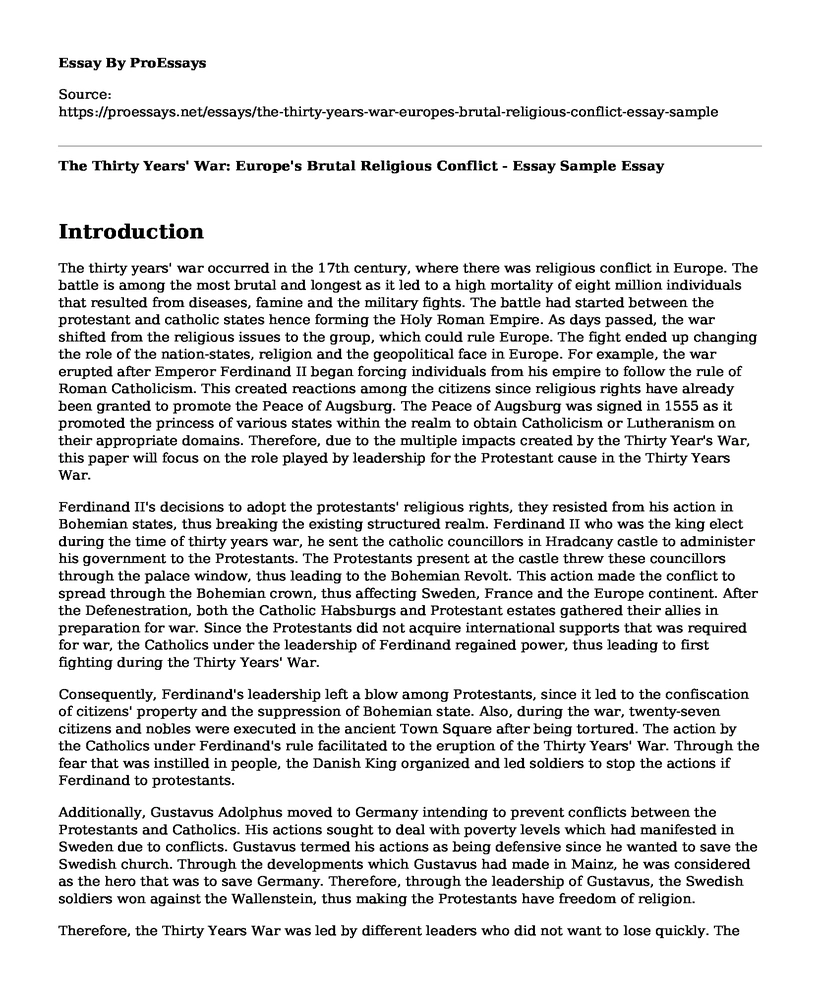Introduction
The thirty years' war occurred in the 17th century, where there was religious conflict in Europe. The battle is among the most brutal and longest as it led to a high mortality of eight million individuals that resulted from diseases, famine and the military fights. The battle had started between the protestant and catholic states hence forming the Holy Roman Empire. As days passed, the war shifted from the religious issues to the group, which could rule Europe. The fight ended up changing the role of the nation-states, religion and the geopolitical face in Europe. For example, the war erupted after Emperor Ferdinand II began forcing individuals from his empire to follow the rule of Roman Catholicism. This created reactions among the citizens since religious rights have already been granted to promote the Peace of Augsburg. The Peace of Augsburg was signed in 1555 as it promoted the princess of various states within the realm to obtain Catholicism or Lutheranism on their appropriate domains. Therefore, due to the multiple impacts created by the Thirty Year's War, this paper will focus on the role played by leadership for the Protestant cause in the Thirty Years War.
Ferdinand II's decisions to adopt the protestants' religious rights, they resisted from his action in Bohemian states, thus breaking the existing structured realm. Ferdinand II who was the king elect during the time of thirty years war, he sent the catholic councillors in Hradcany castle to administer his government to the Protestants. The Protestants present at the castle threw these councillors through the palace window, thus leading to the Bohemian Revolt. This action made the conflict to spread through the Bohemian crown, thus affecting Sweden, France and the Europe continent. After the Defenestration, both the Catholic Habsburgs and Protestant estates gathered their allies in preparation for war. Since the Protestants did not acquire international supports that was required for war, the Catholics under the leadership of Ferdinand regained power, thus leading to first fighting during the Thirty Years' War.
Consequently, Ferdinand's leadership left a blow among Protestants, since it led to the confiscation of citizens' property and the suppression of Bohemian state. Also, during the war, twenty-seven citizens and nobles were executed in the ancient Town Square after being tortured. The action by the Catholics under Ferdinand's rule facilitated to the eruption of the Thirty Years' War. Through the fear that was instilled in people, the Danish King organized and led soldiers to stop the actions if Ferdinand to protestants.
Additionally, Gustavus Adolphus moved to Germany intending to prevent conflicts between the Protestants and Catholics. His actions sought to deal with poverty levels which had manifested in Sweden due to conflicts. Gustavus termed his actions as being defensive since he wanted to save the Swedish church. Through the developments which Gustavus had made in Mainz, he was considered as the hero that was to save Germany. Therefore, through the leadership of Gustavus, the Swedish soldiers won against the Wallenstein, thus making the Protestants have freedom of religion.
Therefore, the Thirty Years War was led by different leaders who did not want to lose quickly. The war led to an increase in mortality rate among the citizens due to famine, diseases and the military fights. Ferdinard II, who governed the Catholics, wanted to assimilate the Protestants, thus causing limitation of their right to religion. Through Ferdinand's leadership, the Protestants were agitated, and they developed resistance, thus leading to the Thirty Years' War.
References
Ringmar, Erik. Identity, interest and action: a cultural explanation of Sweden's intervention in the Thirty Years War. Cambridge University Press, 2007.
Sutherland, Nicola M. "The origins of the Thirty Years War and the structure of European politics." The English Historical Review 107, no. 424, (1992): 587-625.
Cite this page
The Thirty Years' War: Europe's Brutal Religious Conflict - Essay Sample. (2023, Mar 13). Retrieved from https://proessays.net/essays/the-thirty-years-war-europes-brutal-religious-conflict-essay-sample
If you are the original author of this essay and no longer wish to have it published on the ProEssays website, please click below to request its removal:
- The Civil War in Shepherdstown - Research Paper
- Roman's Growth to a Position of a Great Political and Cultural Power
- Research Paper on King Tutankhamun's Canopic Coffinette
- Mozart and Beethoven Essay
- Annotated Bibliography on Gold Rush
- Essay Sample on Russian Foreign Policy Motivations in the Ukraine Crisis of 2014
- Paper Sample on The Last Generation of Slavery: Booker T. Washington







